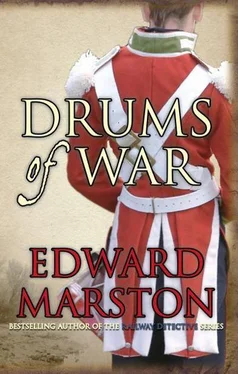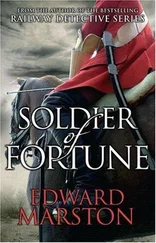Edward Marston - Drums of War
Здесь есть возможность читать онлайн «Edward Marston - Drums of War» весь текст электронной книги совершенно бесплатно (целиком полную версию без сокращений). В некоторых случаях можно слушать аудио, скачать через торрент в формате fb2 и присутствует краткое содержание. Жанр: Исторические приключения, на английском языке. Описание произведения, (предисловие) а так же отзывы посетителей доступны на портале библиотеки ЛибКат.
- Название:Drums of War
- Автор:
- Жанр:
- Год:неизвестен
- ISBN:нет данных
- Рейтинг книги:5 / 5. Голосов: 1
-
Избранное:Добавить в избранное
- Отзывы:
-
Ваша оценка:
- 100
- 1
- 2
- 3
- 4
- 5
Drums of War: краткое содержание, описание и аннотация
Предлагаем к чтению аннотацию, описание, краткое содержание или предисловие (зависит от того, что написал сам автор книги «Drums of War»). Если вы не нашли необходимую информацию о книге — напишите в комментариях, мы постараемся отыскать её.
Drums of War — читать онлайн бесплатно полную книгу (весь текст) целиком
Ниже представлен текст книги, разбитый по страницам. Система сохранения места последней прочитанной страницы, позволяет с удобством читать онлайн бесплатно книгу «Drums of War», без необходимости каждый раз заново искать на чём Вы остановились. Поставьте закладку, и сможете в любой момент перейти на страницу, на которой закончили чтение.
Интервал:
Закладка:
The arrival of their commander-in-chief at the head of fresh squadrons rallied the troops and horse in the centre. In his long scarlet coat with the sky-blue sash of the Garter, he was recognised at once by his men. Unfortunately, in making himself so visible, he also became a target for the French. Rejoicing at the chance to kill the one man who could contrive their defeat, they tried to run him down. Before Marlborough went very far, his horse stumbled at a ditch and threw its rider, leaving him defenceless on the ground. The French cavalry tried to hack their way towards him. It was a critical moment and Daniel was acutely aware of it. To lose Marlborough would be to lose the presiding genius of the Allied army. Leaping from his horse in the middle of the melee, Daniel held its bridle and stirrup while Marlborough heaved himself up into the saddle.
There was more help at hand. Seeing their captain-general in difficulties, Major General Murray marched up rapidly with two Swiss battalions to cover his escape. Some of the pursuing French cavalry were unable to check their galloping horses and rode straight on to the gleaming bayonets of the Swiss infantry. Daniel was a grateful beneficiary While many of the horses were impaled, it was the riders who mostly felt the thrust of cold steel and writhed in agony on the ground. Loose horses were everywhere, neighing in fear, kicking out, bumping into each other and trying to escape the burning cauldron of battle. Seizing a passing bridle, Daniel steadied the prancing stallion enough to mount it. He was now able to wield his sabre to cut a swathe through the enemy. The action was hot and he revelled in it.
Everything turned on the cavalry engagement at the heart of the battle. The elite French squadrons held the early advantage. As the battle raged on, however, and as Marlborough fed more squadrons from the right flank into the action, the balance tilted in favour of the Allies. By late afternoon, when the plain was red with blood and littered with corpses, they had built up a superiority of eight to five. There was marked progress elsewhere as well. On the extreme left of Marlborough, the Danish cavalry beyond Taviers cut through the French anchoring force on the Mehaigne and swung north to threaten Villeroi's flank.
At 4 p.m. Marlborough deemed it the moment to order his final charge. Massing his cavalry, he sent them off at a trot to gain impetus as they went along. The Maison du Roi re-gathered and formed a line to meet them. Two large, proud, urgent, tiring, bloodstained, sweat-covered bands of horsemen charged forward with murderous intent. When they met once again, there was an ear-shattering clang of sabres as they tried to cut down each other like so much human timber. Neither side gave ground. In the mounting frenzy of battle, gaping wounds were opened up, eyes gouged out, hands and arms severed, horses slashed to death and, in one case, a Dutch head cut clean from its shoulders. The French held the charge at first but the numbers told steadily against them. Bursting through the gaps in the enemy squadrons, the Allied cavalry was able to attack from the rear. The end was at last in sight.
Responding to orders, Orkney marched his men forward over the crest of a hill, deploying his forces in such a way as to give the appearance of a sizeable army. In fact, it had been seriously depleted but Villeroi was unaware of that. What preoccupied him was the threat of a second attack on his left flank. The French commander was so fearful of the phantom army beyond the marshes that he did not realise what was happening on his extreme right. The Danish cavalry had encircled the French flank from the south. At the same time, with an irresistible surge, the Allied infantry finally captured Ramillies and drove its garrison out. When the French line broke, its nerve broke with it. The panic-stricken cry of sauve qui peut swept through the whole army and entire brigades ran for their lives.
Marshal Villeroi had lost the battle. As a last resort, he ordered the largely unused cavalry along the Gheete to form a line in order to cover the retreat. Naked fear was the only command they obeyed. To Villeroi's disgust, all 50 squadrons deserted him and rode hell for leather through the fleeing French infantry, knocking many of them over and pummelling some to death. It was a complete rout. The whole plain was a scene of undiluted chaos as thousands of French and Bavarian troops struggled madly to get past abandoned coaches, carriages and carts, running through the mud to escape the flashing blades of the pursuing Allied cavalry. To all intents and purposes, the battle of Ramillies was over.
Behind the victory lay thousands of individual stories, none more remarkable than that of Kit Davies, a tough and spirited woman who'd disguised herself as a man in order to pursue an errant husband into the army. For twelve years she'd enjoyed the life of a roving soldier without once arousing the suspicions of her fellows. Only her husband knew her secret. Ramillies exposed the truth. Davies was injured by a shell that bounced off a church steeple and fractured her skull. When the surgeons examined her, they were dumbfounded by what they discovered. Expecting to treat a wounded man, they had incontrovertible proof that she was a woman.
Marlborough himself would have tales to tell. Apart from being rescued by Daniel Rawson when in the path of the French cavalry, he had had another lucky escape. As he mounted a horse at one point, a round shot fired from a French battery passed under his cocked leg and skimmed the saddle before decapitating Colonel Bringfield who was holding the stirrup for him. A few inches higher and the missile would have killed Marlborough. The result of the battle might then have been different.
One of the incidents that would stay locked in Daniel's mind for ever occurred when the battle was over. He found a moment to congratulate the men from his regiment on their part in the triumph. As he approached them, he saw Major Cracknell lording it over a group of junior officers, boasting about his exploits during the battle. The major was holding a glass of wine and lifting it high. He never got to drink it. A shot rang out and a musket ball burrowed deep into his brain, killing him instantly and making his fist tighten around the glass until it broke apart. The person who'd fired the shot was Tom Hillier. Daniel ran towards him but he was too slow to prevent the drummer from using the bayonet to stab his own heart. When he fell forward, the weapon hit the ground hard and went right through him, piercing the flesh and protruding from his back. Hillier had taken leave of army life altogether. Turning him over, Daniel was astonished by what he saw. It was incredible. In spite of a grotesque death, there was a contented smile on Hillier's young face.
Later on, Daniel discussed it all with Henry Welbeck.
'How did he learn to shoot like that?' asked the sergeant.
'You forget that Tom grew up on a farm like me. He'd have been taught to hunt for game. You quickly learn to shoot straight when you want to put food on the table.'
'He must have picked up a discarded musket.'
'There were thousands of those to choose from,' said Daniel.
'Tom has been biding his time, waiting for his chance.'
'Yes, Henry. I don't think he was acting on impulse. He'd taken all he could from the major and simply had to hit back. When he saw his opportunity, he couldn't resist it.'
'He's not the first soldier to shoot an officer he despised.'
'I daresay he won't be the last.'
'In one sense,' decided Welbeck, 'I suppose he did us all a favour. Everyone will be glad to see the back of Major Cracknell.'
'I'd rather have the major and Tom still alive.'
'The lad was never made for the army, Dan.'
'I disagree,' said Daniel. 'He had all the attributes. His problem was to fall into the clutches of someone like Cracknell.
Читать дальшеИнтервал:
Закладка:
Похожие книги на «Drums of War»
Представляем Вашему вниманию похожие книги на «Drums of War» списком для выбора. Мы отобрали схожую по названию и смыслу литературу в надежде предоставить читателям больше вариантов отыскать новые, интересные, ещё непрочитанные произведения.
Обсуждение, отзывы о книге «Drums of War» и просто собственные мнения читателей. Оставьте ваши комментарии, напишите, что Вы думаете о произведении, его смысле или главных героях. Укажите что конкретно понравилось, а что нет, и почему Вы так считаете.












